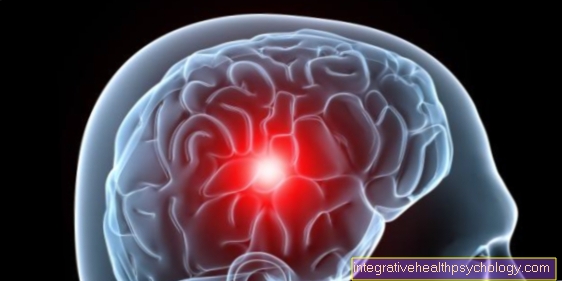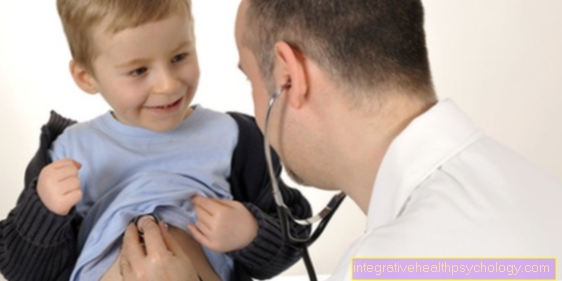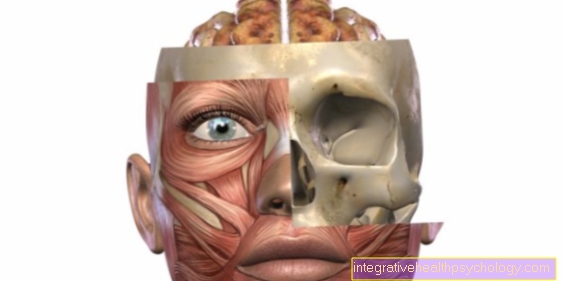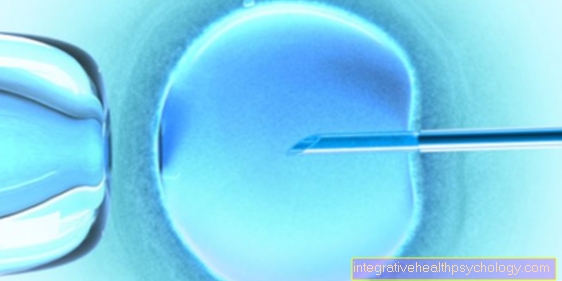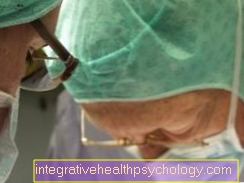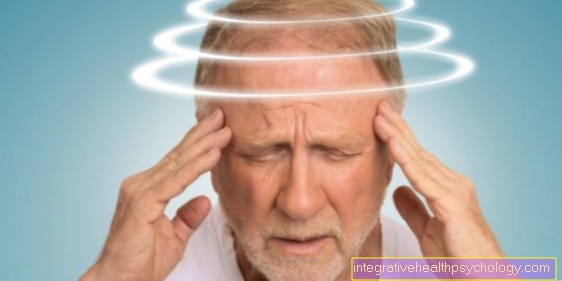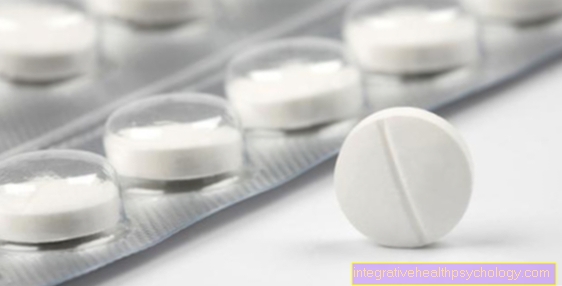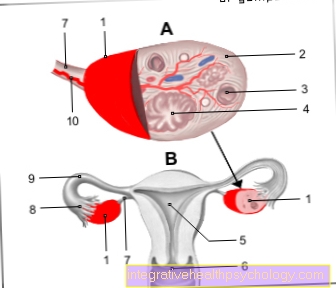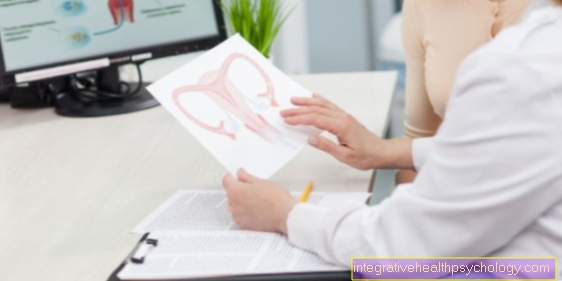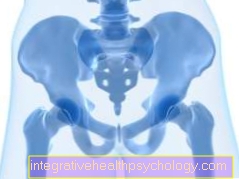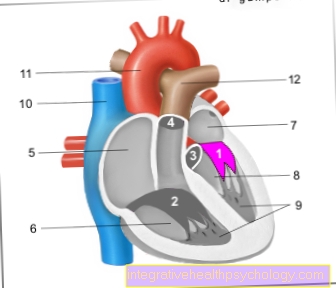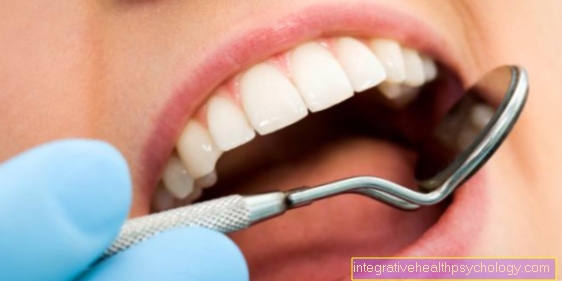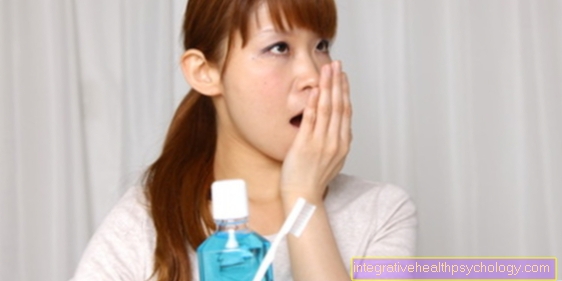These are the causes of an increased heart rate
introduction
A high pulse can have various causes from different areas of medicine. In many cases it is a temporary phenomenon caused by stress or the consumption of certain luxury foods. More rarely, however, hormonal changes or diseases can be behind the increased pulse. In general, the causes can be divided into:
-Temporary causes such as stress, increased activity, pregnancy, consumption of luxury foods or allergies
-hormonal changes during pregnancy or menopause
-hormonal diseases, for example hyperthyroidism
-Diseases of the cardiovascular system such as cardiac arrhythmias, heart attacks, blood loss and strong allergic reactions
Read more about this: Increased pulse
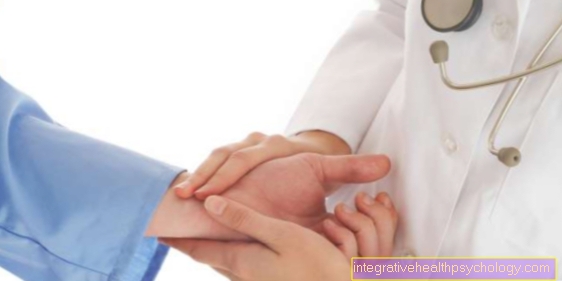
Hyperthyroidism
Hyperthyroidism is a common condition that can be accompanied by numerous symptoms.
Behind this, there can be an automatically activated thyroid hormone production that takes place without any control. This is the case, for example, with the so-called "Graves' disease" or "thyroid autonomy".
As a result, the hormone levels "T3" and "T4" increase in the blood, which can lead to increased activity of the cardiovascular system. In addition to a high pulse, they also cause high blood pressure, sweating, tremors, inner restlessness, sleep problems and weight loss.
One of the most common reasons for increased thyroid values is an overdose of the medication in the context of an underactive thyroid, which deteriorates much more frequently. The increased intake of the hormone L-thyroxine has the same effect as the body's own overactive thyroid.
This topic might interest you: Hyperthyroidism
stress
In stressful situations, the body adapts to the circumstances and triggers stress reactions that are controlled by the so-called “sympathetic nervous system”. The sympathetic system causes changes in all organs of the body.
These reactions cause increased alertness and speed of reaction, as well as other body reactions that are evolutionarily supposed to ease the stress reaction.
These include, for example, dilatation of the pupils, an increase in blood pressure and pulse, an increase in the contraction force of the heart, a widening of the bronchi, a decrease in gastrointestinal and bladder activity and an increase in sweat secretion.
These physical reactions help the body cope with acute stressful situations. However, long-term stress can cause problems such as sleep problems, permanent high blood pressure and long-term vascular damage.
The most important therapeutic measure is a conscious reduction of stress. Drug therapies are only used when other measures fail.
High blood pressure
High blood pressure is a common side effect of an increased pulse rate. This is often due to activations of the entire cardiovascular system, which occur in the context of increased activity, stress, hormonal changes or certain stimulants.
One speaks of high blood pressure when the values are above 140/90 mmHg. High blood pressure appears to develop without cause in many people as they age. In combination with an increased heart rate, however, a physical, treatable cause becomes probable. Therefore, further examinations for possible diseases should be carried out before treatment of blood pressure.
Learn more: high blood pressure
pregnancy
An increased heart rate during pregnancy is initially a normal physical adaptation reaction that does not represent a disease value.
In order to ensure the blood flow to the placenta and thus to the child, not only the pulse but also the blood pressure and blood volume of the woman increase in pregnant women. As a rule, there is an increase in the pulse rate of 10-20 beats per minute.
Of course, illnesses that cause an increase in heart rate can also occur during pregnancy. It is not always easy to distinguish them from normal physical adaptation reactions. However, if the pulse increases unusually sharply, a more detailed diagnosis may have to be initiated.
Related to this topic: Pregnancy hypertension
caffeine
Caffeine is a strong stimulant and stimulant that can be found in various foods. Caffeine can be found in coffee, tea, energy drinks and cola. The caffeine leads to a strong activation of the central nervous system with the typical consequences of an increase in pulse and blood pressure and increased blood flow. It works in a similar way to a stress reaction and can have temporary stimulating effects.
In the long term, however, the high circulatory activity can be associated with consequential damage such as sleep problems, dizziness, vascular damage and cardiovascular diseases.
You might also be interested in: caffeine
nicotine
Nicotine has various complex effects on the central nervous system and numerous other organs.
On the one hand it inhibits so-called "sympathetic" nerves, on the other hand it leads to the release of adrenaline and dopamine and can thus activate the cardiovascular system for a short time and thus increase blood pressure and pulse.
In higher doses, however, it has the opposite effect and tends to lead to relaxation. Overall, nicotine causes a strong dependence and is thus the main reason for cigarette addiction. The negative long-term effects of cigarette smoke primarily affect the cardiovascular system and lead to serious long-term damage.
More on this topic: nicotine
alcohol
Alcohol consumption does not activate the cardiovascular system directly, but often causes the blood vessels to widen and thus a drop in blood pressure.
This often manifests itself in an increased feeling of warmth and reddened cheeks, later this can promote the cooling of the body. The drop in blood pressure is further promoted by the greatly increased urine excretion that occurs with alcohol consumption.
As a result, the heart rate can rise during alcohol consumption in order to maintain blood flow in the body. In addition, physical activity increases under the influence of alcohol, which in turn causes a significantly higher average heart rate.
WPW syndrome
The so-called "Wolff-Parkinson-White Syndrome" is a certain form of cardiac arrhythmia that can be accompanied by an increased pulse rate. Typically, those affected have an additional so-called “conduction path” in the heart that is normally not available. This means that the electrical excitation in the heart does not spread as usual, but can circulate between the atria and ventricles.
The result is faulty excitation lines to the ventricle and additional sudden heartbeats, which are noticeable as an increased pulse and a racing heart. The racing heart is often only temporary and can be consciously interrupted by certain maneuvers. Sometimes life-threatening cardiac arrhythmias can arise. WPW syndrome is a very special and rare cause of an increased heart rate.
Also read this article: WPW syndrome
Menopause
Menopause is the period of hormonal changes between the end of a woman's fertile period and menopause. Already a few years before menopause, the hormone levels of estrogen and progesterone flatten.
The complete changeover continues for a few years after menopause. Overall, it can be assumed that the menopause will last 8-10 years.
During this time, changes in hormones and the resulting reactions of the body can lead to changes and complaints. Activation of the central nervous system with hot flashes, mood swings, sweating and an increased pulse are not atypical. If the symptoms persist, symptoms can be alleviated with medication.
As the menopause subsides, the symptoms also subside in most cases as the body adapts to the new circumstances.
Anemia
Anemia is a common condition.This typically leads to paleness, weakness, tiredness and an increased pulse.
The increased pulse is a compensation mechanism to maintain the body's blood supply despite the anemia. Weakness and tiredness, on the other hand, already indicate a relative lack of blood in various areas of the body.
Probably the most common cause of anemia is an iron deficiency, which results in reduced blood formation. Blood loss through bleeding, chronic illnesses, tumor diseases or infections are also common causes of anemia.
More on this topic here: Anemia
Severe blood loss / shock
Heavy blood loss can have many causes. In total, an adult human has a blood volume of 4.5-6 liters.
The body can usually compensate for blood losses of up to 1 liter without any problems, and the first symptoms can also occur.
In order to guarantee the blood supply to the organs and cells of the body, the activity of the cardiovascular system increases with a reduced blood volume, which increases blood pressure and pulse rate. As blood loss increases, the heart can no longer fill sufficiently with blood, causing blood pressure to drop.
In response to the drop in blood pressure, the heart rate continues to rise. One speaks of shock when the systolic blood pressure value falls below the pulse value. Shock therapy consists in controlling blood loss and supplying fluids and blood products as quickly as possible in order to maintain the circulation.
Learn more: shock
Pulmonary embolism
In a pulmonary embolism, a pulmonary artery is blocked by a so-called "embolus". In most cases this is a blood clot that is flushed into the lungs from another region of the body and then blocks a vessel.
The most common cause of pulmonary embolism is leg vein thrombosis, which loosens and is flushed into the lungs via the heart.
Depending on the extent of the blocked vessel, pulmonary embolism can lead to severe cardiovascular reactions. Stress on the heart is also not atypical, which can lead to a racing heart. Typically, shortness of breath and chest pain continue to occur.
In order to limit the damage to the lungs, an attempt must be made to re-open the blocked vessel as quickly as possible using various methods in order to restore blood flow.
Also read this article: Pulmonary embolism
allergy
Allergies represent a large group of diseases and affect a large number of people. These are intolerances to certain substances that enter the body through the air, food or other routes.
There are different types of allergic reactions that are associated with different mechanisms of origin. A common form of allergy is the "immediate type" allergy. Here the body has already formed antibodies against a certain substance, for example a food, in previous contact. When this substance is absorbed, messenger substances are released within a few seconds to minutes, which can lead to a strong release of histamine and what is known as an "anaphylactic reaction".
The anaphylactic reaction is similar to severe blood loss due to a malfunction in the body and is associated with shock. As a result, blood pressure can drop sharply, causing the pulse to rise enormously.
You might also be interested in: Anaphylactic reaction
Causes of high heart rate at night
A high pulse can also occur at night, which is particularly uncomfortable for those affected as it can wake them up and have problems sleeping. The high pulse at night can be triggered by a wide variety of causes.
Cardiac arrhythmias and cardiovascular diseases can trigger symptoms both during the day and at night. Hormonal disorders can also make themselves felt at night.
Activity and stress-related complaints can decrease at night. However, phases of stress with insomnia and a feeling of panic can also occur at night. The high nocturnal pulse leads to a greater need for treatment and a more severe assessment of their illness, even if the cause is not threatening.

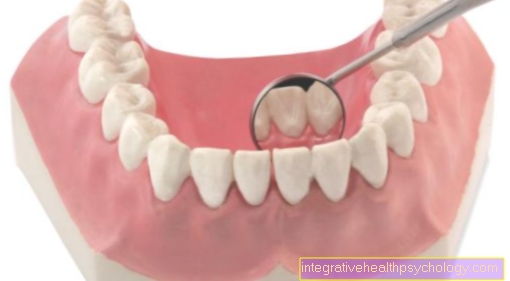
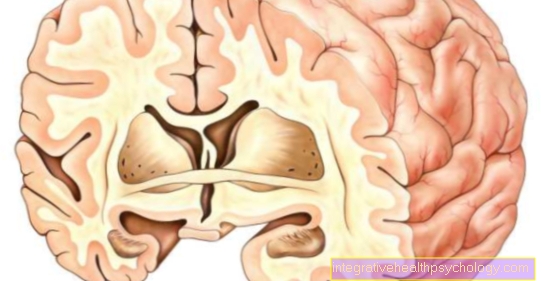
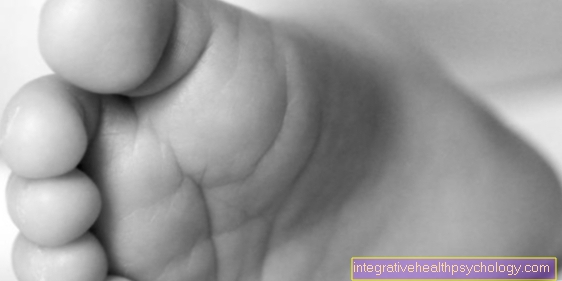
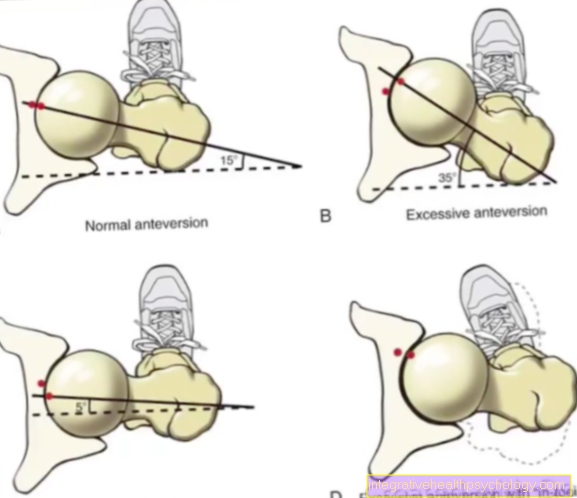
.jpg)

